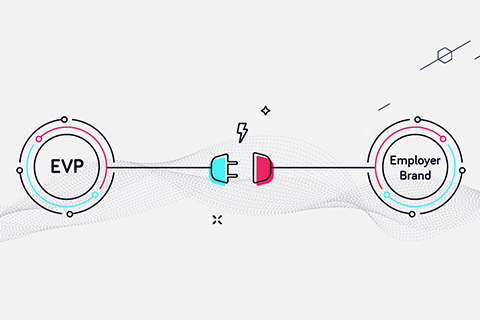A strong Employee Value Proposition (EVP) is crucial for drawing in and keeping top talent in China’s competitive labor market. Whether intentionally created or influenced by experiences, your EVP affects how current and prospective employees view your company. A strong employer brand is enhanced by an engaging EVP that meets the demands of the modern workforce.
Here is everything you should know about EVP and how crucial it is to create a successful workplace in China.
What Is EVP?
The mutually beneficial connection between an employer and employees is outlined in an Employee Value Proposition (EVP). Why employees decide to stay with a company is more important than simply joining it. An EVP describes the benefits that workers can anticipate from their jobs and what is expected of them in exchange.
Crucially, an EVP covers the whole experience of working for a company, not just the perks. Attracting top talent requires a strong EVP as job seekers seek out companies that share their values. In the end, it strikes a balance between employee contributions and the perks and rewards a business provides, encouraging dedication and loyalty.
Examples Include:
|
Quantitative Elements |
Qualitative Elements |
|
Salary |
Career Growth Opportunities |
|
Bonuses |
Leadership Quality |
|
Stock Options |
Role Alignment with Strengths |
|
Health Insurance |
Trust and Collaboration |
|
Retirement Plans |
Positive Team Relationships |
|
Paid Time Off (PTO) |
Company Culture |
|
Gym Memberships |
Reputation for Social Justice |
|
Company Vacations |
Work-Life Balance and Flexibility |
Well-Known Companies Example
- Google: The “Build for Everyone” strategy places a strong emphasis on inclusivity, diversity, and openness while fostering a friendly atmosphere for everyone.
- Apple: “Come along. Be yourself. Celebrates uniqueness and teamwork while emphasizing motivation and social duty.
- Nike: “Move the World” — Encourages collaboration and action, fusing personal development with a dedication to improving sports.
Understanding the Difference between EVP and Employer Brand
Although they complement one another, employer brand and employee value proposition (EVP) have distinct functions:
EVP: This is the value that workers derive from their positions and the contributions they make to the business. It includes perks, company culture, and chances for advancement that raise worker satisfaction. Although the HR and leadership teams typically create the EVP, it must take into account the opinions of the employees regarding their experiences. In the end, it is influenced by how workers feel about their jobs.
Employer Brand: It is the external perception of a business that emphasizes its standing as an employer. A strong employer brand reflects your company’s values and highlights your EVP to draw in new talent.
Steps to Building and Defining an EVP: Attracting Top Talent across China
Attracting and keeping top talent in China requires building a strong employer brand. Take into account the following simplified strategy to successfully mold your EVP and brand:
- Accept Inclusion and Diversity
Cultural Awareness: To guarantee that your EVP speaks to China’s diverse cultural landscape, which encompasses 56 ethnic groups and numerous dialects, collaborate with local talent.
Focus Groups: To improve your hiring practices, talk to local staff members about their needs and values. - Customize Message for Different Generations
Recognize Demographics: Tailor your messaging to appeal to Gen Z, Millennials, and Gen Xers by understanding their varying expectations.
Engagement Techniques: Create content that speaks to each generation’s particular needs for work fulfillment. - Consider Local Preferences
Authenticity Is Important: To improve your brand’s relationship with the market, use relatable slang and regional dialects in communications.
Real Stories: Display employee endorsements that emphasize professional development and individual experiences at your organization. - Look for Talent
Investigate Engagement Preferences: Find out where your target market interacts online and concentrate your marketing efforts there.
Digital Presence: To increase visibility and establish a connection with possible candidates, spend money on social media and targeted advertising. - Utilize Technology to Promote Innovation
Digital Recruitment Tools: To enhance the applicant experience, make use of cutting-edge solutions like career websites with WeChat integration and video resume submissions.
Virtual Engagement: To establish a welcoming online presence, and provide individualized job recommendations and virtual office tours. - Describe Your Value Proposition for Employees
Determine Competitive Advantage: Find out what present workers value most about their work experience by conducting focus groups and surveys.
Put Benefits and Rewards First: Put more emphasis on flexibility, work-life balance, and making significant changes to Societal issues than on flimsy benefits.
Emphasize your unique selling propositions. To direct your EVP messaging, clearly state the qualities that appeal to your employees.
Create a Clear Message: When explaining what makes your business special and why employees stick around, use plain language .
Assure Authenticity: To draw in people who will flourish in your workplace culture, your EVP should showcase real employee experiences.
Why an EVP is Important for Your Business in China?
In China, an Employee Value Proposition (EVP) is essential because it goes beyond platitudes like “Our people are our greatest assets” to convey what candidates can anticipate from working for your company. A compelling EVP draws applicants who share your values and turns away those who don’t.
It takes sincere consideration of the actual benefits you provide to employees to create a successful EVP. The significance of a strong EVP in drawing in and keeping top talent is emphasized by the five pillars covered below.
- Salary
Clear bonus plans and competitive pay are crucial for creating openness and making sure workers feel appreciated. In a job market that is changing quickly and where having a stable income is crucial, this foundation is essential. - All-Inclusive Advantages
Benefits beyond traditional healthcare are sought after by contemporary workers. Particularly in China, where maintaining a work-life balance is becoming more and more crucial, flexibility, generous paid time off, and wellness initiatives are highly prized. - Professional Development Opportunities
Workers are keen to develop and progress. A company’s dedication to employee success is demonstrated by providing training courses and clear career pathways, which promotes retention and loyalty. - A Positive Work Environment
A secure, encouraging, and stimulating workplace is essential. More output and job satisfaction result from establishing a friendly environment where staff members feel inspired and at ease. - A Robust Corporate Culture
A sense of belonging is fostered when company values are in line with those of employees. A cohesive workplace is produced by encouraging inclusivity and shared values via team-building exercises and candid communication.
Common EVP Mistakes and How to Avoid Them?
Attracting and retaining top talent requires a compelling Employee Value Proposition (EVP). Here are two typical errors to steer clear of, though:
- Undervaluing the characteristics, culture, and values that set your business apart.
- Promoting an EVP that isn’t accurate to oversell the experience.
Step 1: Obtain Accurate Input
To find out what your employees value and how they perceive the culture of your business, use surveys or focus groups.
Step 2: Evaluate and Improve
Verify that the experiences of new hires match the promises made by your EVP. If there is a gap, adjust.
Step 3: Verify with a Wider Audience
To keep your EVP current and relevant, get outside feedback and make necessary adjustments.
Pro Tip: Even if your EVP has already been defined, put it in writing and make sure it accurately represents your brand and mission. Moreover, try to engage your group by making sure that your staff members are aware of and enthusiastic about what makes your workplace unique. To remain aware of employee needs, review and update your EVP regularly.
Is Your EVP Working in China? Here is How to find out!
Here’s how to assess your EVP’s impact quickly:
- Employee Surveys: Use anonymous questionnaires to get candid opinions about career paths, benefits, and company culture. Utilise exit interviews and review site insights to pinpoint common problems.
- Turnover Rates: Keep an eye on turnover rates; high numbers suggest possible EVP problems that should be fixed to lower hiring and training expenses.
- Marketing Analytics: To make sure your marketing strategy is working, use tools like Google Analytics to monitor social media job posting engagement and traffic to career pages.
By putting these strategies into practice, you can enhance the working environment and improve your EVP!
Wrap Up
In conclusion, attracting and keeping talent in a competitive job market in China requires a strong EVP. It highlights the benefits and opportunities while showcasing your company’s distinctive values and mission. A well-defined EVP boosts employee loyalty and attracts new hires by cultivating Meaningful connections with current staff members. This helps your company succeed in China’s changing business environment.






